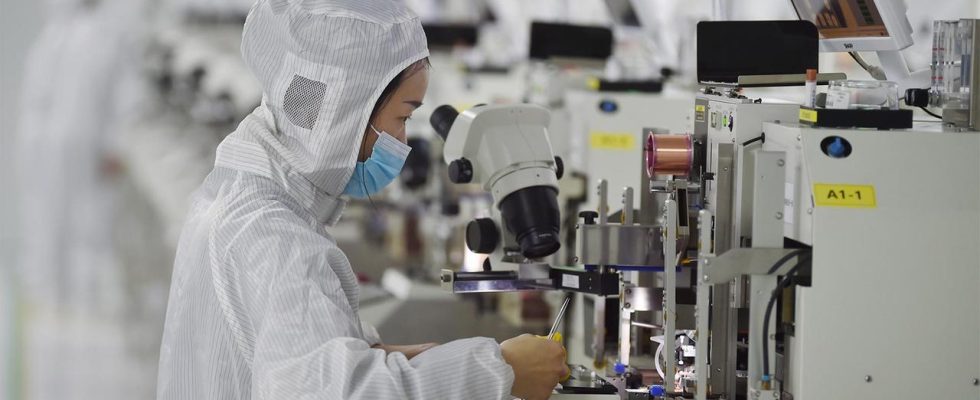In order to advance new technologies, China depends on the import of modern microchips. But the US is creating a bottleneck with its sanctions. Taiwan also plays a role in this.
For months, the United States has been trying to use sanctions to prevent China from importing and producing state-of-the-art microchips. These are needed, for example, for the development of artificial intelligence, in space travel and in the military. The Netherlands and Japan have also joined the sanctions.
However, China cannot yet produce the high-tech microchips itself and is therefore dependent on chips and machines from abroad. How badly are the sanctions really affecting China? And what role does the democratically governed island of Taiwan play?
Chip prices doubled several times
“Buckle up, please,” says the onboard computer. A car drives fully autonomously in normal city traffic without a driver – there is only one attendant in the driver’s seat who can intervene in an emergency. This has been permitted on certain roads in the southern Chinese technology metropolis of Shenzhen for almost a year. Dubbed the “Chinese Silicon Valley” by some, the metropolis of twelve million is home to many large Chinese high-tech companies such as Huawei, Tencent and ZTE.
Palm trees and skyscrapers characterize the cityscape in the highly modern district of Nanshan. The windows are brightly lit up to the highest floors, even late at night. Because the employees of the approximately 4,000 high-tech start-ups don’t sleep. They develop, research, experiment and produce – like the employees of the Chinese robotics company Elephant Robotics, which was founded seven years ago. The start-up is experimenting with artificial intelligence and sometimes also uses computer chips from abroad.
A robotic arm the size of a child’s arm sorts colorful wooden cubes into different containers. The robot can distinguish a red wooden cube from a green one on command. Regarding the US measures, Qiu Lisha, who is responsible for the start-up’s overseas market, says: “In the past, international sanctions have had some impact on us. Especially when the microchip sanctions started, the price for doubled the chips several times, so the financial pressure on us at the time was very high.”
High-performance chips should not end up in the military
Since October last year, the US government has imposed new export restrictions after various rounds of sanctions. These are intended to prevent the People’s Republic from importing and producing the latest high-tech microchips. The Netherlands, which owns ASML, a company that manufactures machines for chip production, has joined the sanctions. Japan was recently added.
“I think the main intention is to ensure that China cannot use a large volume of these special chips for artificial intelligence and especially for artificial intelligence in the military,” explains Antonia Hmaidi. At the Merics China Research Institute in Berlin, she conducts research on the chip industry and artificial intelligence in China, among other things.
The People’s Republic cannot yet produce the tiny high-performance chips under seven nanometers in size itself. According to international experts, one of the biggest challenges for China will be to replace the machines for manufacturing from abroad. Because without these systems, chip production is not possible.
Hard to catch up with the West?
Nevertheless, according to Hmadidi, China is not entirely in a fix. “You can do almost anything you do with the new chips with older chips.” This requires more electricity, more resources and more money. But she is convinced that the Chinese industry will find ways to deal with the sanctions.
In addition, one cannot control all the chips in this world. “If we talk about 1,000 or 10,000 chips, then a Chinese company that is internationally positioned will always get something from it,” says the expert. In case of doubt, the transport then runs through three countries.
Chinese experts like Xing Yuqing, who is currently doing research at the Japanese GRIPS institute in Tokyo, assume that China will be able to produce high-performance chips itself in the future. “The sanctions will force Chinese companies to conduct their own research, forcing them to invest more time and more money,” says the economics professor. Still, international observers question whether China can ever catch up as the competition also evolves.
No interest in military confrontation
90 percent of the most advanced microchips are made in Taiwan. China sees the country as its own territory and repeatedly threatens the democratically governed island with military force. The expert Hmaidi from the China research institute Merics estimates that the high-performance chips in particular could protect Taiwan from a military confrontation to a certain extent. A blockade of supply chains around the Taiwan Strait would affect everyone economically, including the US, which supports Taiwan militarily.
In addition, according to Hmaidi, neither China nor the USA are ready for a military conflict: “It’s still the case that both sides have a great interest in not going to war now.” Both parties believe that they still need to greatly improve their military equipment to be sure they can win a war.
However, an incident at the beginning of June shows how tense the situation is. A Chinese warship pushed aside a US destroyer in the Taiwan Straits. Observers warn that such incidents are becoming more frequent and could also lead to an unintentional escalation.

